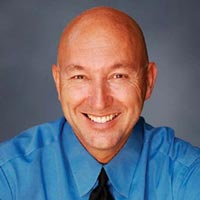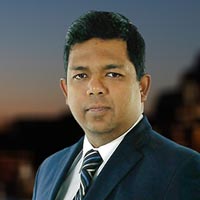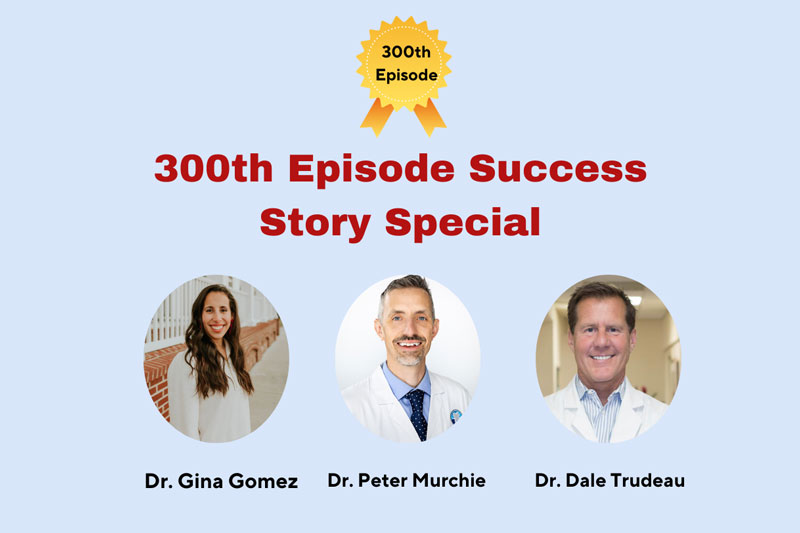Episode #302: You Can Have a Profitable Practice AND Serve Those In Need
Listen Now
Podcast: Play in new window | Download
Subscribe: RSS
We just reached Episode #100! Woohoo!
Gary wanted to do something very special for our awesome listeners to show our appreciation to you for being with us & supporting us throughout.
We know that It’s every dentist’s dream to be 100% FFS. But many dentists are afraid. Afraid to lose existing patients & think it wouldn’t work in their town.
In this episode, Gary decided to interview Dr. Tracey Hughes. Dr. Hughes is one of Gary’s coaching clients who have successfully resigned from all PPO plans & is 6 months into her journey being 100% Fee-For-Service.
Just like all of us, her practice too was shut down for more than 30days but has now re-opened and continuing their Fee-For-Service journey.
Gary:
Welcome to an another addition to the Less Insurance Dependance Podcast. This is a very exciting episode for us because its episode number 100. What? Yeah, its episode number 100! So I wanted to do something very special for episode 100. And I wanted to actually do an interview. Now those of you who are faithful listeners of the Less Insurance Dependence Podcast will know that normally its just Naren and myself and we share information that will help you successfully reduce your insurance dependence. But, I kinda thought it would be super cool to have a guest on the 100th episode. And let me introduce her, her name is Dr. Tracey Hughes. First of all, hey Tracey how are you?
Tracey:
Hi Gary! Thank you so much for having me, I’m doing great!
Gary:
Oh, its my privilege to have you. Now let me explain to our listeners why I wanted Tracey to be on episode 100. She is a client of mine and she has also successfully navigated insurance in her practice and is now completely free for service. Its great! You know if I can share a little bit of history. In December of 2019, Tracey resigned from the last PPO plan that she was on. And the last one was Delta—
Tracey:
A big one
Gary:
—A big one. By the way, it represented Delta about 51 per cent of her patients. So this was not a light hearted decision. Is that a fair statement Tracey?
Tracey:
That’s quite a fair statement. I was quite nervous about that actually…
Gary:
You were…Rightfully so, 51 per cent of your patients were on Delta PPO. Well, she successfully resigned in December. And I’m gonna let her talk a little bit about what’s happened since. Ofcourse this year’s been different for all of us. But she had January, February, and about half of March out of network. And then like so many offices she was shut down, like all of us. She’s in Louisville, Colorado. She was able to re-open around the middle of May. In fact, I think it was May 18th. Does that sound right?
Tracey:
Yes, that’s exactly right.
Gary:
I only remember because it was two weeks later than us. My life smiles practice opened up May 4th and Colorado was a little bit behind us based on the numbers and you were able to successfully re-open on May 18th. Since then, you’ve had about half of May, all of June, all of July, and now all of August.
Tracey:
Right…All of August…Last day of August today.
Gary:
The last day, as we’re recording it is the last day of August. You know, now we have your practice, you know somewhere around six months of experience being out of network. Tracey, can you talk a little bit about your decision to resign from Delta, because I imagine there are many of our listeners thinking “gosh that sounds like me! About half of my patients have Delta, I’m not sure whether I could ever go out of network”. So would you share a little bit about your thought process? And then maybe we’ll talk about what’s happened.
Tracey:
Right. I had been in-network with Delta essentially my whole dental career and I’ve been in Dentistry owned practices for about 20 years…and it just got incredibly difficult. Delta got incredibly difficult to work with. I really felt the financial strain. I think my average write off with Delta dental patients was 40% – 42% every procedure I do I had to discount my fee by 42%. And I tell you what, I was feeling it. I just didn’t have enough at the end of the month. Sometimes, it was very month to month and the strain financially of having to discount my fees was almost suffocating. I really really felt the strain of having to discount those fees and the extra work on the back end of having to track down these past-due claims and all the effort that my team members will have to put into it. There was a lot of stress and pressure on my team members, having to keep up with all the hoops we would have to go through just to get the check.
Gary:
Tracey, I appreciate you for many reasons, you’re an amazing dentist…
Tracey: Thank you.
Gary: …you’re clinical skills are absolutely amazing. But one of the reasons I really appreciate you is because of your integrity and I’m gonna tie this specifically into your practice. And you had one standard of care, whether the patient was a fee for service patient or a Delta patient. Correct?
Tracey: That’s accurate.
Gary: So you weren’t using different labs if it was a Delta patient, you weren’t using like folding chairs, I’m being facetious—
Gary: You have a beautiful office…absolutely beautiful…
Tracey: Thank you.
Gary: And your patients receive one standard of care, there’s no compromise there. So the person that was getting short changed while you were in network was you.
Tracey: Right.
Gary:
You were the one that was taken out a 40 to 42 percent of a cut on your fees.
Tracey:
Right. And it was even above the bare minimum so I would maybe say I’m doing 10 units and the maximum was 1500 dollars and I would still have to discount all 10 units, which was really really difficult.
Gary:
You know that’s one of the things that really irritates me about PPO plans. According to their contract, they can set your fees on uncovered services on services that they don’t cover at all. And they have in most states, in most PPO contracts, they have the right to set your fees whether they provide any coverage at all, which seems to me just fundamentally wrong. I mean if they don’t do service like if they don’t have any coverage for implants they shouldn’t be able to dictate your fees. However, that’s not how the PPO plans work, they use it as a lever, to adversely affect dentists and frankly, it’s one of those irritants that I feel are very unfair. Tracey, talk a little bit about what happened, as the holidays completed, we had to give a 30-day notice to Delta. All of a sudden, now here we are at the beginning of the New Year, and you’re out of network. Because there’s a fun side story about your daughter. But before we get into that talk about what happened in January February and March.
Tracey:
Well, right from the start of the New Year actually it was quite exhilarating to really receive 100% of my fee for treatment. The patients were very understanding for the most part. We took several months to talk to our patients in person—thanks to your coaching Gary—my team became extremely well-trained and confident in their ability to talk to patients and explain why we were going out of network and I think that was a huge key point to our success. And as we went through the New Year and eliminated the Delta dental contract and started seeing patients it was really refreshing to see how understanding our loyal patients were. They said, ‘oh, that’s easy…You’re gonna submit the claim and the cheque will still come to me within 7-10 business days…Oh, no problem. Sometimes they needed to be reminded and they would say, ‘whoa wait, you’re not taking my insurance anymore..’ and we would just remind them how easy the process was and they were like ‘oh, that’s no big deal’. So for the most part they got it, sure I had a few people leave…um, not nearly as many as I thought so I was very happy with the patient retention.
Gary:
What was my message to you? I’ll put you on the spot here Tracey—
Tracey: Oh boy (laughs)
Gary:
When you were thinking of going out of network and I said Tracey you’re going to lose some, there’s no getting around that if a patient only comes to you because you’re in-network, you know you may lose some. But I remember sharing with you and I said, ‘Tracey, you’re going to lose fewer than you might think’.
Gary: And that became rather prophetic. Yes?
Tracey: Yes, that was true, very much so.
Gary:
I have vivid memories of getting text messages from you, after the first of the year you know saying ‘woohoo I’m free for service, I’m actually getting my full fee. You don’t know how liberating this feels!’
Tracey:
Its very true and I have absolutely no regrets. And I would do it all over again. And my biggest regret—oh, okay—I just said that I have no regrets, I do have a regret. I regret that I didn’t do it sooner. That’s my regret.
Gary:
You don’t know how good that makes me feel Tracey. Especially for our listeners. You know, one thing that might be useful for them to know, you’re in Louisville Colorado.
Tracey: Right.
Gary:
Which is a suburban…Well, there’s parts of Louisville that are semi-rural still. But I would characterize it as very much a blue-collar community, is that accurate?
Tracey: Yeah, I would say so.
Gary: You certainly have a mix of patience like we do in Life Smiles.
Tracey: We do
Gary:
You have some executives that are patients of yours. You’re not far from Boulder and you have some highly educated people associated with the University of Colorado.
Tracey: That’s true.
Gary:
Most of your patients are really just great, solid, middle class.
Tracey: They are. That’s true.
Gary: So it’s not like majority of your patients are affluent. They’re working-class folks.
Tracey: They are. They very much are.
Gary:
Which is very eerily similar to my own practice. We’re in Phoenix kind of our sweet spot is, right in the middle blue-collar, working-class folks and we love em.
Tracey:
Yeah, and they’re very loyal people as well. They like to return the loyalty and I think, the willingness for them to stay and come back, even though we made these changes is very apparent.
Gary:
How did that feel to you on an emotional level when you know the patient has made a conscious decision to stay with you. Even though it would be easier for them to go to a networked dentist. How did that feel to you emotionally?
Tracey:
Well, it really warms my heart. My philosophy in practice is relationship dentistry; to create relationships with people. And we work very very hard to do that. And we see one patient at a time in our practice. We write down little notes, and when they come back, ‘oh, did you have your have your grand-baby join your family this year?’ and we kind of carry on the conversation. So, it’s very personal. And to have them being somewhat hesitant, you can see the wheels turning a little bit when we first talked with them about the changes that we were implementing. And then now we’re to the point where we’re actually going through the second appointment and re-care with them. And it’s like ‘oh its no big deal’, and they just really get it.
Gary:
Especially when you explain to them that, although we aren’t contracted with Delta you can still use your benefits here. You know, a point that I’ve made throughout this podcast is although reducing insurance dependence we’re still gonna be patient-friendly and insurance friendly. Now, the words that the patient might use, maybe not so much to you Tracey, but maybe to a team member is, ‘so you’re not taking my insurance anymore?’ Which isn’t accurate.
Tracey: Yeah
Gary:
Your team really had great verbal responses. “Oh no, no, we will be happy to do…we’re gonna go bat for you like we always have. We’re gonna use every dollar of benefit that you have and we’ll still file your claims. We’ll do everything we’ve done before, we’re just not gonna be contracted with it.”
Tracey:
And that was a big part of it. ‘Oh, I don’t have to do the paperwork, absolutely not we’ll submit the claim electronically for you. I think that’s a big part of it too. People don’t wanna have to do the paperwork. So we still advocate for the patient, to do that for them, to be patient-friendly.
Gary:
Right. Now, I’m privy to a side story, that happened when you re-opened. And your daughter, your 16 years old daughter…
Tracey: Just turned 16
Gary:
Just turned 16, deserves massive compliments. Would you fill in our listeners to that side story?
Tracey:
I would love to, its a fun story. I’m very proud of my daughter.
Gary: As you should be
Tracey:
When I called my team to come back on May 18th, for a respectful reason my office administrator decided not to return to work, so I was short-handed at the front, coming back after being closed and figuring out all these new protocols and a little bit of higher stress because of that, and I threw my daughter into the front office administrator position. She’d never had a job, a little bit of an awkward 15-year-old in their communication. Hardly every talks on the telephone—
Gary:
Wait, an awkward 15 turning 16 years old?
Gary: Remember I raised four of them.
Tracey:
Right. Right…Communication skills, well I thought, well let’s just have her answer the phone and help out. And the fact that we were not in-network with Delta dental anymore or contracted with any insurances really helps streamline the efficiency of the front office. And I truly believe the fact that I was out of network wit hall networks allowed me to really come back, open the office and take the bull by the horns and really move forward successfully. And she was able to talk to patients about insurance, she was able to process payments, didn’t have to deal with all that back end following up on outstanding claims, she was able to spend her time doing what was most important. Which was establishing relationships with patients? It really made the role of an office administrator easy, that a 15 just turning 16-year-old girl came right in and…Honestly, she was probably one of my best friend’s office administrators that I’ve worked with. Now she’s back to school and I miss her and we’re training somebody else. But again training new employees without having all the restraints of the insurance is so much easier, streamlined, and efficient.
Gary:
Well, and you’re being very soft-spoken about how incredible your daughter was. But I will simply report that she did incredibly well completely belied her age or experience. She was all about taking care of patients. She was all about letting people know how appreciated they are in your practice. And she gets an A++ on my report card and the data shows, the numbers show that she did extremely well. You know, I don’t think that would’ve happened if you would have lost your office administrator and still been involved…You know one time you had many plans in the practice. Can you imagine, forget her age for a minute, but anyone stepping in with no dental experience and having to navigate all the land mines of insurance?
Tracey: No way.
Gary:
No, she did incredibly well. So hats off to Cambie she did incredibly well. Now she got some of your value systems for sure and she may have been paying attention at home when we weren’t quite sure whether she’d been paying attention. She might have been paying attention, a little bit.
Tracey: She might have
Gary: But she did incredibly well and really the success story has simply continued because now you’re in the stage as you mentioned where you’re now seeing patients returning for the next visit in hygiene. And you’re just seeing loyalty, appreciation. They are letting you know, they are voting with your feet. They are letting you know “Dr. Hughes, I’m not going anywhere else”. I would never leave your practice, I’m a patient for life. Sometimes they also use those words, but I’d rather watch their behavior. Because their behavior is, they’re with you.
Tracey:
They are, they definitely have developed trust and confidence in our practice and we’ve even had a patient that was…So we allowed patients, if they seemed hesitant at all to go through this process we said ‘you know what we really understand, this is a new territory we’re treading into and we really want you to be able to try this out. Before you make any decision to leave our practice and stay with us as an outer network provider. There were a handful of patients that we would sort of trying this on. And if they were Delta as you know, the cheque would have to go to the patient. So these patients that we had long term relationships with we allowed them to go ahead and have the check assigned to the patient. We would carry the balance and we would follow up with them or they would call us and say, ‘you know I got my cheque, just as you said within 7 to 10 business days. No problem’. And they were comfortable with it then we collected their balance with a credit card. I had one patient who didn’t have such a great reimbursement out of network and he had already found a new plan with another company that had better out of network benefits. So he was so loyal, he didn’t wanna go somewhere else where maybe Delta would pay 100% he found an out of network plan, but out of network sometimes pays pretty good, it pays 100% of our fee, and he had already switched.
Gary:
I mean, talk about loyalty. A patient literally on their own finding an insurance policy, that pays better out of network because they don’t wanna go anywhere else. It just warms my heart, you know to hear those stories. Tracey, we’re kind of coming to the finish line here, um one of the points that I’ve made, you know repeatedly to our listeners here on this podcast is that… a couple of things. One if you are going to be successful going out of network, one of the strongest things you can do is build the relationship-driven part of your practice. And in many ways, I think your practice is a model, relationship-driven practice. I don’t know how to ask you this question without setting you up…But would you agree?
Tracey:
yeah, I agree. Its actually on the front door. That’s kind of our tagline as relationship dentistry, but yeah its really really hard.
Gary:
It is at the front door. (laughs) Says relationship dentistry…
Tracey: Yeah. I work very hard for that, and that’s the way I want to practice. Definitely patient loyalty in return for that is very very high. Patients want to come to us, they don’t want to go to another office and not everybody does, you can’t be everybody’s dentist. Some people are more insurance-driven and that’s fine. But that opens the door for more of these patients. But we developed a relationship very early on with the initial phone call. And I like to call and welcome the patient personally. We have little things that, people like—the paraffin hand dip, the TV on the ceiling—but I think more to it is that we just take time for the patient. We see one patient as a time as I mentioned earlier. And I can really get to know the patient and they come back because of that.
Gary: You know, I’ll talk about a couple of other things, as we wrap up here, the point I wanna make is that you give your patients many reasons to come to you, other than you’re on their insurance. You give them many reasons.
Tracey: Right. I hope so.
Gary:
You do. It’s a full list, it’s a very rich list of things that you provide. Technology, you have state of the art technology in your practice. One of the things I love about your office is that the way you have some really beautiful after photos of your patients. That’s something that you’ve really kind f taken it to an awesome level. You ask the patient to sign the after photo and write a short note.
Tracey: Right
Gary: Those photos are…You can’t help but be drawn to those photos. And you can’t help but read what they have to say. Every one of them has glowing praise of their beautiful smile.
Tracey:
It is, and my assistant makes sure as she’s bringing the patient back that she does a tour and she stops and pauses and says, please take time to read these or take a look at these if you’d like to take your time after your appointments. So as they’re coming back up from the treatment room to the consulting room they take time to look at those photos and to read what the patients have written.
Gary: Yeah, yeah…You know there are so many reasons for people to choose your office. Well Tracey, thank you…You know Dr. Omar Reed shared with me that um, sometimes people need to know that it’s been done before. Dr. Reed used to use the quote ‘if it’s been done before it must be possible.’ I’m sure you’ve heard that.
Tracey: I take that one to heart actually.
Gary:
Omar probably said that one time when you were at his courses…But Omar often said that ‘if it’s done before, it must be possible’. I wanted our listeners to hear from you. Hear from this 100th episode. You’ve done it, its possible, you’re in a highly competitive area. I mean it’s not like there aren’t other dental choices…
Tracey: Very much so
Gary:
Everywhere…You’ve done extremely well and I’ll repeat what you said earlier, you said your only regret is that you didn’t do it sooner.
Tracey: That’s true.
Gary:
So I just want to thank you. I treasure our coaching relationship, I’ve loved working with your team. Really when we do team meetings, their pens are smoking taking notes. And I know they’re going to apply the information that they learn. But you’re also a wonderful leader in providing them the leadership, the encouragement, and the resources to do their job well. So let me take a minute and say thanks to you Tracey, and thanks for being a voice here on the podcast. Our first interview in 100 episodes and thanks for being like a lighthouse that points the way. And nothing would make me happier than the listeners of this episode to think ‘wait a minute, if Dr. Hughes can do this, I think I can do it too.’ I’m inspired, I’m encouraged.
Tracey: That’s very true.
Gary: Thank you, Tracey, for being that guiding light.
Tracey:
Thank you so much from the bottom of my heart, I appreciate all your help and coaching to get us to this point. Its something I’ve been wanting to do for many many years. So thank you so much.
Gary:
Oh, it’s mutual. Want to take a minute and thank our listeners of the Less Insurance Dependence Podcast, we love what we do here. Couldn’t do it without you, three things you can do to support our work; number one you can tell a colleague about the Less Insurance Dependence Podcast, there might be some dentists out there that haven’t discovered podcasts yet. Hey, let them know about Podcasts and let them know about the Less Insurance Dependence Podcast. The second thing you can do is, you can jump on iTunes and write us a review, help more dentists find us. And the third thing you can do is to hit the subscribe button. You can so that on iTunes or Google Play or whatever your podcast directory of choices. Just hit subscribe and every Thursday when we upload a new episode it’ll be automatically uploaded for your listening convenience. On that note let me simply thank you for the privilege of your time and tell you I will look forward to connect with you n the next Less Insurance Dependance Podcast. Thanks so much.
 One of Gary's most significant achievements as a dental practice management coach is transforming his own practice, LifeSmiles, from one that was infected with PPO plans, no effective marketing strategy, and an overhead of 80% to a very successful dental practice that is currently one of the top-performing practices in the US.
One of Gary's most significant achievements as a dental practice management coach is transforming his own practice, LifeSmiles, from one that was infected with PPO plans, no effective marketing strategy, and an overhead of 80% to a very successful dental practice that is currently one of the top-performing practices in the US.
 As CEO of Ekwa Marketing, Naren has over a decade of experience working with dental practices and helping them attract the ideal type of patients to their practices. It is his goal to help dentists do more of the type of dentistry they love with the help and support of effective digital marketing.
As CEO of Ekwa Marketing, Naren has over a decade of experience working with dental practices and helping them attract the ideal type of patients to their practices. It is his goal to help dentists do more of the type of dentistry they love with the help and support of effective digital marketing.



